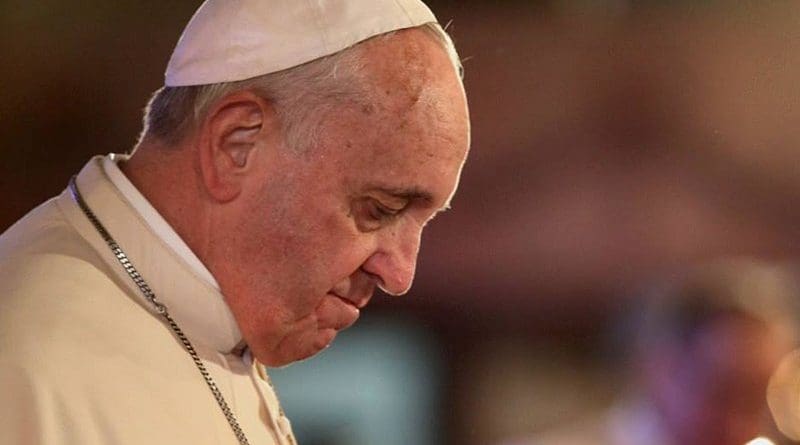Pope Francis, R.I.P. – OpEd
Catholics around the globe are mourning the death of Pope Francis. He touched millions of the faithful, including non-Catholics and non-believers.
When Cardinal Jorge Bergoglio assumed the role of Pope Francis, his down-to-earth style captured the plaudits of Catholics and non-Catholics alike. It was his unscripted, and often spontaneous, manner of speaking that made him so authentic and appealing.
It also got him into trouble, especially when speaking to reporters aboard the papal plane following a trip overseas. On many occasions, following a chat with journalists, the Vatican press corps had to clarify what he meant. But no one criticized him for not speaking from the heart.
Unfortunately, the end of his pontificate was troubling. His approval of a Vatican document that allows priests to bless same-sex couples was met with widespread criticism. Indeed, it was so divisive that it seriously undid much of the goodwill he previously earned.
For the most part, the media treated Francis with kindness, though they did not always accurately report what he said. For example, his much publicized remark, “Who am I to judge?”, was misquoted by the media. What he actually said was, “Who am I to judge him?” That is not a small difference. He made his comment in response to a question about a particular priest who had been accused of a sexual impropriety; it was not an endorsement of homosexuality.
It spoke well for Pope Francis that he rejected the practice of publishing the names of accused priests, something that is unheard of in every other institution. Regrettably, his inability to see through the deceitful character of his friend and fellow Jesuit, Bishop Gustavo Zanchetta—he was sentenced to prison by an Argentine court for sexually abusing seminarians—revealed a serious blind spot, one that earlier emerged in his dealings with priestly sexual abuse in Chile. Zanchetta is still a bishop.
More recently, Pope Francis’ passivity in dealing with accused serial predator Fr. Marko Rupnik, another friend and fellow Jesuit—he was charged with grave, and indeed sacrilegious, sexual offenses—was another serious error in judgment. Rupnik was finally dismissed from the Society of Jesus in June 2023. After he was excommunicated, he was reinstated! Inexplicably, the pope allowed him to remain a priest in good standing. In fact, he kept a picture of him in his office.
Worse, Pope Francis chose as one of his most senior advisors, Luxembourg Cardinal Jean-Claude Hollerich, a man whose passion for gay rights led him to say that the Church’s opposition to gay sex is outdated. The pope knew this yet appointed him the “relator general” of the Church’s “Synod on Synodality.” The Synod, itself, proved to be a source of great consternation among many bishops.
The pope’s strong defense of the rights of the unborn, and his condemnation of gender ideology, sat well with conservative Catholics. But they were not happy when he refused to honor questions regarding his apostolic exhortation, Amoris Laetitia; prominent prelates sought clarification on some doctrinal issues. The Holy Father was clearly more critical of conservative bishops than he was their liberal counterparts.
Even more significant, his attack on traditionalists, especially those who favor the Latin Mass, were frequent and lacking in nuance. Yet at the same time, Francis welcomed known Catholic dissidents, men and women who were previously condemned by officials in Rome and the United States for sabotaging the Church. His embrace of Sister Jeannine Gramick was the most conspicuous example of this phenomenon.
Pope Francis often spoke about the need to decentralize the Church, yet he did more to centralize the power of the papacy than any of his predecessors in modern times.
He took away the right of bishops to approve new religious communities in their dioceses and changed canon law so he could fire bishops. His decision to essentially take control of the Pontifical Academy of Life, and the former John Paul II Institute for Marriage and Family, angered many in the U.S. He also took control of the Sovereign Order of Malta, ordering a new constitution and new senior officers.
On foreign affairs, Francis took a soft and conciliatory approach to the Chinese Communist regime, which sought to crush the Catholic Church. The arrest of Cardinal Zen, and the silence with which the Vatican greeted the news, did not sit well with many Catholics.
The Russian invasion of Ukraine was condemned by the Vatican, though the Holy Father’s statement blaming NATO, and not Putin, was seen as an example of his alleged anti-Western, and anti-American, bias.
In November 2024, the pope stunned Catholics and Jews alike when he called for an international probe of Israel’s decision to defend itself from Hamas terrorists; he inquired whether this constituted genocide.
In what proved to be a real eye opener, the pope admitted that as a young man the person who did more to shape his thinking about politics was a female communist atheist, Esther Ballestrino. She introduced him to prominent communist publications.
Pope Francis made his mark on the Church, much as John Paul II and Benedict XVI did. It remains to be seen whether his successor will hew more closely to his stance than that of his predecessors. May he rest in peace.

